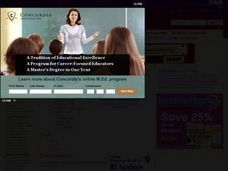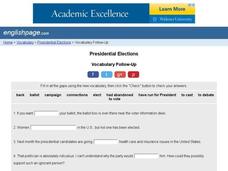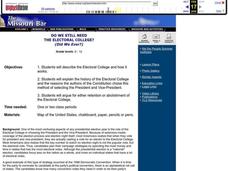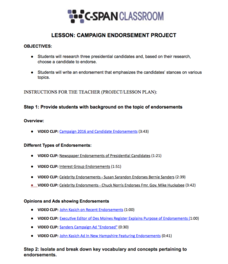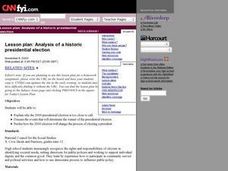Curated OER
Getting to Know the Candidates: Analyzing Their Campaign Ads
Pupils examine the role of advertising in presidential campaigns. They analyze one candidate's advertising campaign ads for elements such as major issues, positivity, negativity, facts, and opinions.
Curated OER
A Race to Watch: Campaign 2008, The Role of Technology and the Internet
Students listen to a statement about the role the Internet plays in the political process and respond by placing a card under the appropriate agree/disagree sign at the front of the room. Students brainstorm reasons to select their...
PBS
Analyzing the Candidates in the 2008 Presidential Election
High schoolers research the 2008 presidential candidates and the required process for becoming an American presidential candidate. The class discusses both the process and the candidates, and some of the reasons someone might want to run...
Curated OER
Covering the Campaign Trail: Technological Progress or Temporary Chaos?
Students study the changes in reporting and journalism techniques that have evolved due to advances in technology by reading an online transcript. They debate whether the technological advances are positive or negative in the reporting...
Curated OER
Campaign Finance Reform and Public Opinion
Students discuss the issue of finance reform in political campaigns. Using the internet, they identify the positives and negatives of finance reform and research the problems associated with campaign fund-raising. They share their...
Curated OER
Campaign 2000
Students research newspapers and the Internet to learn about the election. Students work in groups and choose a state that they want to compare to Florida. Students organize the data they have found into a graph labeling an "x" and "y"...
Curated OER
"The Election"
Students participate in an election for the purpose of comprehending the political process and the responsibilities that come with citizenship in a free society. They elect officials with no identity and are surprised with the revealing...
Curated OER
Presidential Elections: Vocabulary Skills
In this online interactive English vocabulary skills worksheet, students answer 10 fill in the blank questions regarding presidential elections. Students may submit their answers to be scored.
Curated OER
Election Time Line
In this reading a time line about the election of the president worksheet, students read about the campaign, inauguration, primaries, national conventions and election day and put them in chronological order. Students rearrange 5 events.
Curated OER
Special Interests: How Would A Legislator Vote?
Students act as elected officials who must make decisions that will make someone unhappy. They consider five bills that are up for vote in light of the contributions that many special-interest groups made to their campaigns. Students...
Curated OER
Do We Still Need the Electoral College?
One of the most confusing aspects of any presidential election year is the role of the Electoral College. Learners read a bit about how the Electoral College works and then they hold a mock election in their classroom. They'll redraw a...
Encyclopedia Britannica
Candidate Position Research
As part of their study of the US Presidential election process, class members research a presidential candidate's position on a specific topic or topics. Formatting their research as a pro/con question ("Should the Death Penalty Be...
C-SPAN
Campaign Endorsement Project
So many politicians, so many endorsements! Learn to differentiate between facts as well as the process of endorsements with an informative resource. Class members watch current endorsement videos, research candidates from three different...
Carolina K-12
The Electoral College
Put the Electoral College into perspective with a simulation of an election. Scholars experience an electoral vote, participate in an in-depth discussion on the topic, and engage in a congressional committee where they learn about the...
Encyclopedia Britannica
Beyond a Two-Party System
Young political scientists go beyond the two-party system and research third-party candidates running in the 2020 US Presidential election. Groups present background information about the candidate, the party's platform points, and a...
Caucus 101
Linkage Institutions: Interest Groups: Option A
How are elections really run and won? Learn about special interest groups, super PACs, and lobbyists with an engaging activity about the caucus process. Young voters research specific interest groups and analyze their part in previous...
Encyclopedia Britannica
Presidential Qualifications
Can anyone grow up to be president of the United States? As part of their study of the 2020 election, groups research the constitutional requirements to become president. The class then brainstorms a list of qualifications beyond those...
Curated OER
How the Media Uses Polling Data in Presidential Election Coverage
Students research and analyze polling data in journalism. They discuss reasons that polling data is included in media coverage of presidential elections.
Annenberg Foundation
Student Voices
Whether it's an election year or not, a unit on voting patterns and political campaigns will awaken the civic pride in your high school citizens. Divided into six parts, the curriculum covers various facets of an election, including...
Carolina K-12
Citizens United v. Federal Election Commission & the First Amendment
Should Congress limit how much a corporation spends to support a political candidate? Here is a fantastic lesson plan and activities to help young citizens approach this question.
Curated OER
Un-Presidented Election
Students explore the results of the 2000 presidential election. They look back at important issues in the campaign and write newspaper articles which cover specific angles on the election.
Curated OER
Election Vows
Students examine the topic of same-sex marriage as a campaign issue, by reading and discussing "Gay-Marriage Fight Finds Ambivalence From Evangelicals." students evaluate the top five issues of importance to them;.
Curated OER
Analysis of a Historic Presidential Election
Learners research the 2000 presidential elections. They explain why the presidential winner was initially too close to call, discuss how the winner was determined and predict how the 2000 election might change the process of electing a...
National Endowment for the Humanities
The 1828 Campaign of Andrew Jackson and the Growth of Party Politics
High schoolers analyze changes in voter participation and regional power, and review archival campaign documents reflecting the dawn of politics as we know it during the critical years from 1824 to 1832. Students utilize worksheets and...


